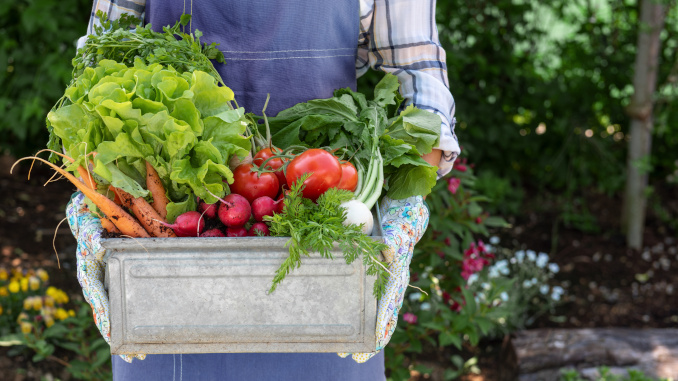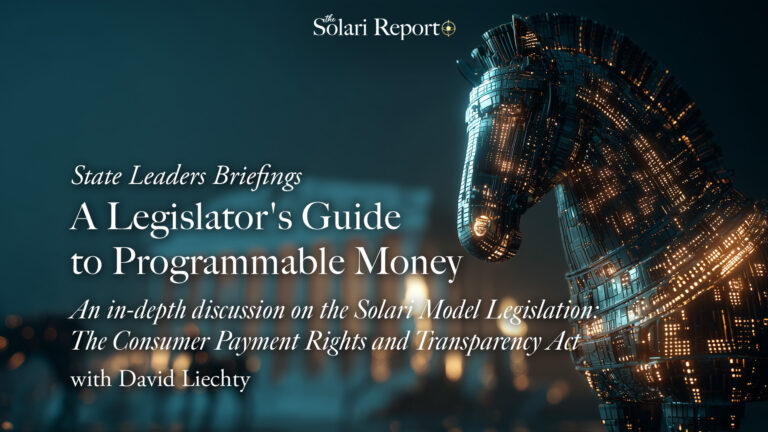
Food Series: Leading a Food Revolution with Symbria and Sara Patterson
Become a member: Subscribe
- Money & Markets
- Weekly Solari Reports
- Cognitive Liberty
- Young Builders
- Ask Catherine
- News Trends & Stories
- Equity Overview
- War For Bankocracy
- Digital Money, Digital Control
- State Leader Briefings
- Food
- Food for the Soul
- Future Science
- Health
- Metanoia
- Solutions
- Spiritual Science
- Wellness
- Building Weatlh
- Via Europa
Solari’s Building Wealth materials are organized to inspire and support your personal strategic and financial planning.

Missing Money
Articles and video discussions of the $21 Trillion dollars missing from the U.S. government
No posts
- LATEST
- TOP SECTIONS
- SERIES
- Money & Markets
- Weekly Solari Reports
- Ask Catherine
- News Trends & Stories
- Equity Overview
- Cognitive Liberty
- Young Builders
- Building Wealth
- The War for Bankocracy
- Digital Money, Digital Control
- State Leader Briefings
- Food
- Food for the Soul
- Future Science
- Health
- Metanoia
- Solutions
- Spiritual Science
- Wellness
- Via Europa
- BLOGS
- RESOURCES
- COMMUNITY
- My Account
- Log In
- Subscribe
- Search
- Shop
- Support
- Donate
- Log Out
Food Series: Leading a Food Revolution with Symbria and Sara Patterson

Listen to the Interview MP3 audio file
Download the Interview MP3 audio file
“The Farm-to-Consumer Legal Defense Fund is proud to announce that Utah farmers Symbria and Sara Patterson are the winners of the first annual Gravel Road Gang Activism Scholarship, an award recognizing FTCLDF members for success in work on food freedom legislation and initiatives. Mother and daughter own and operate Red Acre Farm in Cedar City, Utah, producing raw milk, meat and vegetables.” ~ Farm-to-Consumer Legal Defense Fund, January 6, 2016
By Pete Kennedy, Host of the Solari Food Series
There are two food systems: industrial and local. The stronger the local food system is, the better off individual health, food safety, food security, and the rural economy all are. The regulatory climate is the biggest reason there is not a more prosperous local food system; there are too many one-size-fits-all laws where small farmers and local artisans can’t afford the cost of compliance. The best way to strengthen the local food system is by deregulating local food commerce, especially by allowing for unregulated transactions.
The best place to accomplish that goal has been in the state legislatures.
In Utah, the mother-daughter team of Symbria and Sara Patterson have led a revolution over the past five years in working to pass numerous food and agricultural laws, helping to establish a much more favorable climate for local food producers to operate in. The Pattersons explain how they have navigated opposition from agribusiness and state regulators to achieve their success.
[From CAF:]
In Let’s Go to the Movies this week, I recommend Insight: Slaughtered on Suspicion. The documentary describes the slaughter of 14 million animals in the United Kingdom in 2001 based on the models of Neil Ferguson and the Imperial College. Sixty-five British farmers went on to commit suicide, raising ongoing questions about the computer-modeling-based slaughter of millions of animals. This incident and others like it underscore the importance of ensuring that Pete Kennedy and his guests and colleagues have the resources needed to defend and protect our local farmers, ranchers, and food resources.
It’s the last week of the month, so there is no Money & Markets this week. Subscribers can e-mail or post questions and story suggestions for Money & Markets for the following week here.
Related Reading:
Farm-to-Consumer Legal Defense Fund
The Weston A. Price Foundation
Utah Raw Milk and Homemade Food Bills Now Law
Red Acre Center
Solari Report Resources:
9 Comments
Comments are closed.
Our mission is to help you live a free and inspired life. This includes building wealth in ways that build real wealth in the wider economy. We believe that personal and family wealth is a critical ingredient of both individual freedom and community, health and well-being.
Nothing on The Solari Report should be taken as individual investment, legal, or medical advice. Anyone seeking investment, legal, medical, or other professional advice for his or her personal situation is advised to seek out a qualified advisor or advisors and provide as much information as possible to the advisor in order that such advisor can take into account all relevant circumstances, objectives, and risks before rendering an opinion as to the appropriate strategy.
Be the first to know about new articles, series and events.

9 Comments
-
Thank you for this. The timing of this is very fitting for a current project I’m working on.
I live on a 6 acre property on the outskirts of Omaha, NE. I have recently decided to pull the trigger on a lifelong goal/dream of mine and am in the process of building a commercial greenhouse on my property where I will be running an aquaponic farm. We will be raising fish and vegetables with the goal of feeding my family and the local community.
-
How wonderful! I also know another subscribers who is taking an aquaponics course in Colorado and building a set up in her home. One of the Solari team has aquaponics experience. Please keep us posted on how this goes.
-
-
Here’s a list of legislation the Patterson’s and Red Acre Cemter (RAC) have worked on the last five years that have become laws:
2015 — House HB 104 legalized distribution of raw milk and raw milk products through herdshare
agreements by micro-dairies (no more than 2 cows, 10 goats and 10 sheep).
2018 — Senate SB 108 allowed unlicensed raw milk producers to sell up to 120 gallons monthly on the farm and also allowed licensed producers to sell raw milk off farm from a refrigerated vehicle.
— House HB 181 allowed the unregulated sale of all foods (including poultry and rabbit) except meat and raw milk products direct from producer to consumer.
2019 — Senate SB 246 reduced acreage required for urban farmer to apply for tax break on land that is actively cultivated.
— House HB 256 removed licensing and inspection requirements for egg producers with less than 3,000 hens who sell to consumers, restaurants, and institutions (e.g., schools, hospitals, nursing homes).
— HB 412 removed restrictions to allow ranchers raising domesticated game to slaughter on site if the end product is sold directly to the consumer.
2020 — House HB 232 allowed farms and ranches to hold farm-to-fork events and the food need not be prepared in a commercial kitchen but with a permit from the health department the food can instead be prepared in a private home kitchen.
— HB 358 adopted the federal requirements for on-farm poultry processing and eliminated state requirements previously in place; under federal law, states must have requirements that are at least as strict as the federal ones.
— HB 134 legalized the sale of raw butter and raw cream by licensed raw milk producers.-
WOW. WOW. We need their equivalent in every state. Amazing what Senator Nicely in TN, Red Acres Center in Utah have accomplished. WOW.
-
-
Red Acre Center (RAC) is a true grassroots nonprofit that runs on a shoestring’ budget; it’s worthy of financial support even if from outside Utah.
. Typically, when any legislator is asked to sponsor a bill, the responae is, “Has this been done anywhere else?”
. Thanks to RAC, we can say, “Yes!” for many aspects of local food law and policy.
. Please give RAC your support and call 435-704-1222 or e-mail symbria0@redactecenter.org; you can make a donation and/or become a member.-
Pete:
Solari will sign up for the annual donation. Remarkable what RAC has accomplished. Thanks for introducing us to them and thanks for posting.
Catherine
-
-
I was doing some research for someone on glyphosate roundup and came across this on a google search – it was not a website but was at the top of the google search list:
Ad: http://www.bayer.com/ U.S News – EPA: Glyphosate – Does Not Cause Cancer The EPA again reached conclusions supporting the long-standing record of glyphosate safety. This referred to a U.S. News article (Below)
I thought there were lawsuits about this and have seen Roundout displayed prominently has the story changed? Confusing information
https://www.bayer.com/en/glyphosate-homeowner-use.aspx?expand=1.8
According to a US News article the Environmental Protection Agency has again reached conclusions that support the long-standing record of safe use for glyphosate, the main active ingredient in many Roundup brand weed killers.
The article notes that glyphosate does not cause cancer or pose a public health risk when proper application procedures are followed.
Agriculture Secretary Sonny Perdue cheered the EPA finding, saying it is based on science and consistent with the findings of other regulatory authorities.
https://www.usnews.com/news/national-news/articles/2019-04-30/epa-glyphosate-the-herbicide-in-roundup-does-not-cause-cancer-
Banned in At least 40 countries due to the health problems it causes
https://www.baumhedlundlaw.com/toxic-tort-law/monsanto-roundup-lawsuit/where-is-glyphosate-banned/
-
Good one – will post.
-
-
Comments are closed.





















































































































Thank you for this. The timing of this is very fitting for a current project I’m working on.
I live on a 6 acre property on the outskirts of Omaha, NE. I have recently decided to pull the trigger on a lifelong goal/dream of mine and am in the process of building a commercial greenhouse on my property where I will be running an aquaponic farm. We will be raising fish and vegetables with the goal of feeding my family and the local community.
How wonderful! I also know another subscribers who is taking an aquaponics course in Colorado and building a set up in her home. One of the Solari team has aquaponics experience. Please keep us posted on how this goes.
Here’s a list of legislation the Patterson’s and Red Acre Cemter (RAC) have worked on the last five years that have become laws:
2015 — House HB 104 legalized distribution of raw milk and raw milk products through herdshare
agreements by micro-dairies (no more than 2 cows, 10 goats and 10 sheep).
2018 — Senate SB 108 allowed unlicensed raw milk producers to sell up to 120 gallons monthly on the farm and also allowed licensed producers to sell raw milk off farm from a refrigerated vehicle.
— House HB 181 allowed the unregulated sale of all foods (including poultry and rabbit) except meat and raw milk products direct from producer to consumer.
2019 — Senate SB 246 reduced acreage required for urban farmer to apply for tax break on land that is actively cultivated.
— House HB 256 removed licensing and inspection requirements for egg producers with less than 3,000 hens who sell to consumers, restaurants, and institutions (e.g., schools, hospitals, nursing homes).
— HB 412 removed restrictions to allow ranchers raising domesticated game to slaughter on site if the end product is sold directly to the consumer.
2020 — House HB 232 allowed farms and ranches to hold farm-to-fork events and the food need not be prepared in a commercial kitchen but with a permit from the health department the food can instead be prepared in a private home kitchen.
— HB 358 adopted the federal requirements for on-farm poultry processing and eliminated state requirements previously in place; under federal law, states must have requirements that are at least as strict as the federal ones.
— HB 134 legalized the sale of raw butter and raw cream by licensed raw milk producers.
WOW. WOW. We need their equivalent in every state. Amazing what Senator Nicely in TN, Red Acres Center in Utah have accomplished. WOW.
Red Acre Center (RAC) is a true grassroots nonprofit that runs on a shoestring’ budget; it’s worthy of financial support even if from outside Utah.
. Typically, when any legislator is asked to sponsor a bill, the responae is, “Has this been done anywhere else?”
. Thanks to RAC, we can say, “Yes!” for many aspects of local food law and policy.
. Please give RAC your support and call 435-704-1222 or e-mail symbria0@redactecenter.org; you can make a donation and/or become a member.
Pete:
Solari will sign up for the annual donation. Remarkable what RAC has accomplished. Thanks for introducing us to them and thanks for posting.
Catherine
I was doing some research for someone on glyphosate roundup and came across this on a google search – it was not a website but was at the top of the google search list:
Ad: http://www.bayer.com/ U.S News – EPA: Glyphosate – Does Not Cause Cancer The EPA again reached conclusions supporting the long-standing record of glyphosate safety. This referred to a U.S. News article (Below)
I thought there were lawsuits about this and have seen Roundout displayed prominently has the story changed? Confusing information
https://www.bayer.com/en/glyphosate-homeowner-use.aspx?expand=1.8
According to a US News article the Environmental Protection Agency has again reached conclusions that support the long-standing record of safe use for glyphosate, the main active ingredient in many Roundup brand weed killers.
The article notes that glyphosate does not cause cancer or pose a public health risk when proper application procedures are followed.
Agriculture Secretary Sonny Perdue cheered the EPA finding, saying it is based on science and consistent with the findings of other regulatory authorities.
https://www.usnews.com/news/national-news/articles/2019-04-30/epa-glyphosate-the-herbicide-in-roundup-does-not-cause-cancer
Banned in At least 40 countries due to the health problems it causes
https://www.baumhedlundlaw.com/toxic-tort-law/monsanto-roundup-lawsuit/where-is-glyphosate-banned/
Good one – will post.